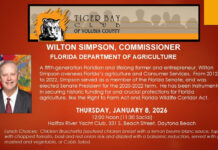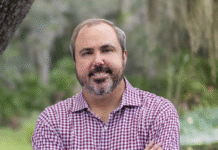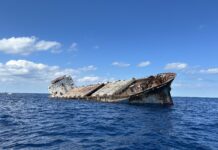Bunnell, Fla. — FLORIDA DEPARTMENT OF HEALTH-FLAGLER URGES FLORIDIANS TO PREVENT CARBON MONOXIDE POISONING DURING AND AFTER STORMS; EVERY HOME SHOULD HAVE AT LEAST ONE OPERATIONAL CARBON MONOXIDE ALARM
In 2017 during and after Hurricane Irma, over 500 Floridians were poisoned by carbon monoxide (CO). Of the 14 Floridians that lost their lives to CO poisoning, 12 deaths were due to improper portable generator usage – one due to running a car inside a garage and another due to CO from fire and smoke.
The Florida Department of Health urges Floridians to prevent CO poisoning, when power outages occur after hurricanes and tropical storms. Alternative sources of power can cause CO to build up in a home and poison the people and animals inside. CO is found in fumes produced by burning fuels such as gasoline, natural gas, propane, kerosene, charcoal and wood. Large amounts of CO can quickly overwhelm a person without warning which leads to greater risk of illness or death especially with increased exposure time.
Since symptoms of CO poisoning are similar to those of the flu, food poisoning or other illnesses, you may not think CO poisoning is the cause. The common signs and symptoms include headache, nausea, weakness, abdominal discomfort/pain, dizziness and confusion. Children, pregnant women and individuals with heart conditions are most vulnerable.
Anyone who suspects symptoms of CO poisoning should immediately go outside the home or building to fresh air and seek prompt medical attention. If a person has collapsed or is not breathing, move them outside to fresh air and call 911 for emergency medical assistance immediately.
Tips to help prevent CO poisoning:
- Never use a portable generator or a fuel-powered tool indoors or in other enclosed or partially enclosed areas. Always place portable generators outdoors on a dry surface far away (at least 20 feet – further if possible) from doors, windows, vents and air conditioning equipment that could allow CO to enter.
- Never use outside equipment like a charcoal grill, hibachi, lantern, portable camping stove or propane or natural gas grills/burners inside a home, tent, or camper.
- Never leave the motor running in a vehicle parked in an enclosed or partially enclosed space, such as a garage.
- Install battery-operated CO alarms or plug-in CO alarms with battery backup inside a home at least one per level and bedroom cluster.
For more information about suspected poisoning emergencies, call the Florida Poison Information Center at 1-800-222-1222.
To learn more about carbon monoxide poisoning prevention, visit www.FloridaHealth.gov/environmental–health/carbon–monoxide/index.html or the Radon and Indoor Air Program at 1-800-543-8279.
View our Florida Health Minute on Carbon Monoxide Poisoning Prevention at https://youtu.be/wXXWXqp_LMk .
About the Florida Department of Health
The department works to protect, promote and improve the health of all people in Florida through integrated state, county and community efforts.
Follow us on Twitter at @HealthyFla and on Facebook. For more information about the Florida Department of Health please visit www.FloridaHealth.gov.











































